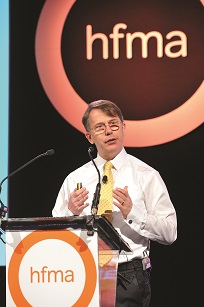News / Baumann: reserve will contribute to system balance
The commissioning sector in England met its
statutory financial duties in 2016/17 and has made an additional contribution to the overall balance of the system, NHS England chief financial officer Paul Baumann (right) said.

At the start of the financial year, commissioners set aside 1% of their budgets (£800m) that could be used to cover any year-end overspend in providers. As the year progressed, it became increasingly clear that all the reserve would be needed. In February, Mr Baumann confirmed that all the funds would be required to balance the system.
With purdah in operation due to the general election, official year-end figures have not been published by NHS England and NHS Improvement – both were due in May.
However, Mr Baumann told the NHS England May board meeting: ‘Subject to audit, we have achieved all of our financial duties in 2016/17 and I can confirm that we have fulfilled our commitment to make an additional contribution to system balance in line with the reserve that we took at the beginning of the year.
‘Given the very challenging circumstances we’ve experienced in 2016/17, this feels like quite a significant achievement,’ he added.
In the past, Mr Baumann has said that contributing to the reserve had a significant impact on clinical commissioning groups, reflected in a rise in savings requirements from an average of 2.2% in 2015/16 to 3% in 2016/17.
Unofficial figures from NHS Providers estimate that the year-end aggregate provider deficit will be between £700m and £750m. It said a £725m deficit – the mid-point of its estimate range – would be 70% lower than the 2015/16 deficit of £2.45bn.
If NHS Providers’ figures are accurate, this will represent a significant turnaround from quarter three, when providers forecast an aggregate deficit of £873m. However, it would still be at least £120m more than the planned £580m deficit.
Despite this, NHS Providers chief executive Chris Hopson said the estimated year-end position was a big achievement. It reflected ‘a huge amount of hard work by trusts to control costs, increase productivity and improve efficiency while continuing to provide outstanding patient care’.
Cost improvement had grown, with agency staff savings estimated to have reached £770m, or 20% of the total.
Mr Hopson added: ‘A year-end performance of between -£700m and -£750m would be a particularly good achievement given that trusts reported a £238m deterioration in Q3, due to the immense operational and financial pressures caused by record demand over the winter period.
‘Our estimate means that trusts have recovered more than two-thirds of that deterioration in the last three months.’
However, 2017/18 looked difficult, with NHS England funding growth falling to 1.3%, compared with 3.6% in 2016/17.
‘Two-thirds of trusts told us at quarter 3 that they were very or fairly reliant on one-off non-recurrent savings to meet their year-end figures. We estimated this accounts for about £1bn of the estimated gain. It’s also clear that, with this 2016/17 year-end result, the sector will struggle to eliminate the provider deficit in 2017/18 as originally planned. In our view, given the drop in 2017/18 funding, providers will do exceptionally well to match 2016/17’s deficit.’
Mr Baumann expressed his appreciation to CCGs, commissioning support units and NHS England – ‘and particularly to the finance teams who work their socks off at this time of year to produce the accounts to the required standards of quality’, he added.
Related content
We are excited to bring you a fun packed Eastern Branch Conference in 2025 over three days.
This event is for those that will benefit from an overview of costing in the NHS or those new to costing and will cover why we cost and the processes.